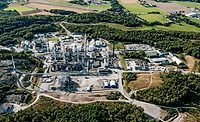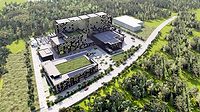Consortium Receives EU Backing for Green Hydrogen Project

AMSTERDAM — A consortium comprising Nouryon, Gasunie and four other partners will receive an €11-million European grant towards a proposed green hydrogen project in Delfzijl, the Netherlands. The project is a front-runner among several hydrogen initiatives aimed at cutting carbon emissions and will be a significant milestone in the transition to a more sustainable, circular economy, the companies say.
The Fuel Cells and Hydrogen Joint Undertaking (FCH-JU), a partnership of the European Commission and industry that supports the development of innovative hydrogen technologies, is granting the funding. The 20-megawatt (MW) electrolyzer, to be owned and operated by Nouryon and Gasunie, would be the first of its kind to be implemented in Europe on this scale.
The other four partners involved are: McPhy, which will provide its innovative alkaline electrolysis technology to convert renewable electricity into 3,000 tons of green hydrogen per year; BioMCN, which will combine the hydrogen with CO2 from other processes to produce renewable methanol, reducing CO2 emissions by up to 27,000 tons per year; DeNora, a producer of electrodes, a key component of the electrolysis technology; and sustainable energy consultant Hinicio.
Nouryon and Gasunie plan to take a final investment decision for the plant in 2020. In parallel, the two companies are studying options to increase the plant’s electrolyzer capacity from 20 MW to 60 MW to make green hydrogen to produce sustainable jet fuel in a project with another group of partners.
The project is also supported by an additional €5 million in subsidies from Waddenfonds, a fund that invests in projects in the northern Netherlands.
Knut Schwalenberg, President Industrial Chemicals at Nouryon, said, “This project will be a stepping stone for the circular economy. With the support of the EU and the region and backed by an experienced technology supplier and customer agreements, we are ready to move to the next phase of implementing Europe’s first large-scale hydrogen plant in support of a more sustainable future.”
Bart Biebuyck, Executive Director FCH-JU, added, “The FCH JU supports the development of high-performance electrolyzers by European industry that can operate dynamically on renewable energy, helping to balance the electricity grid. Scaling up in this field is key for sustainable industry, transport and buildings and this project is a firm step in moving towards electrolysis of hundreds of megawatts or even gigawatts.”
Looking for a reprint of this article?
From high-res PDFs to custom plaques, order your copy today!







